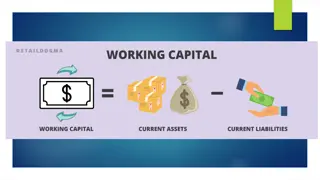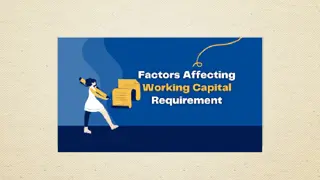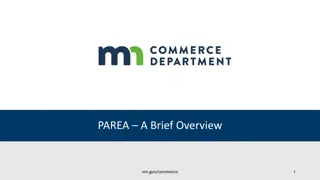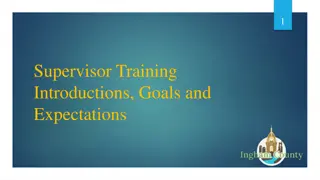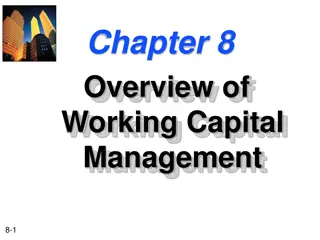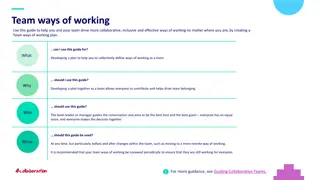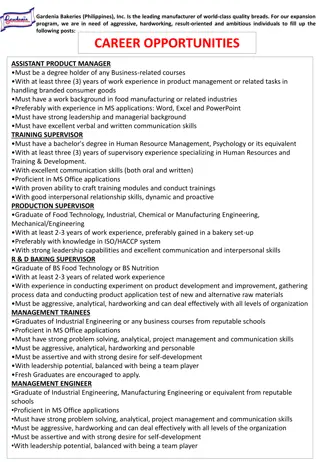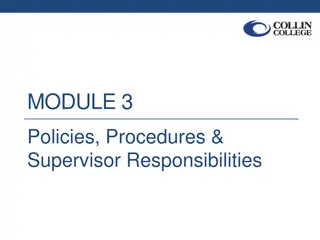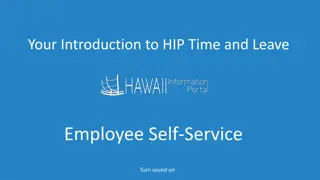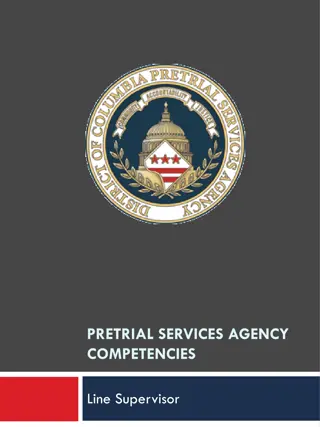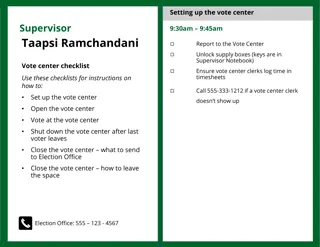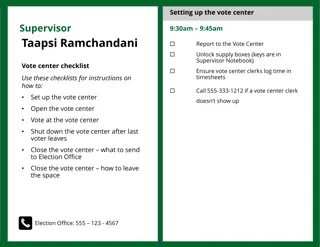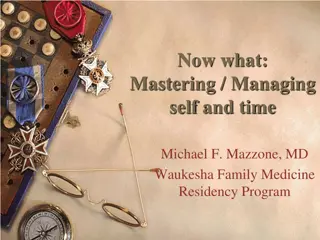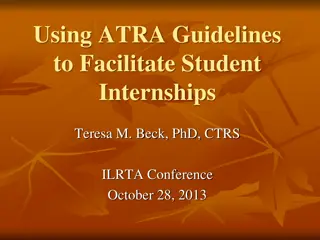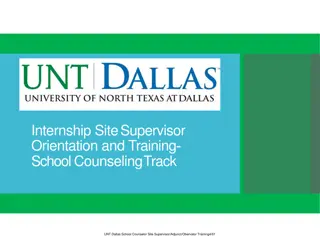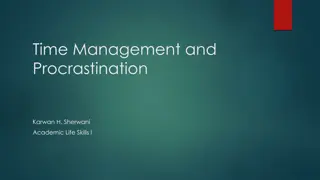
Effective Time Management Strategies for Better Productivity
Learn practical tips from Professor Joy Hinson on setting SMART goals, using Gantt charts, prioritizing tasks, and avoiding distractions to improve time management skills. Explore examples of SMART goals and gain insights into managing both time and tasks effectively.
Download Presentation

Please find below an Image/Link to download the presentation.
The content on the website is provided AS IS for your information and personal use only. It may not be sold, licensed, or shared on other websites without obtaining consent from the author. If you encounter any issues during the download, it is possible that the publisher has removed the file from their server.
You are allowed to download the files provided on this website for personal or commercial use, subject to the condition that they are used lawfully. All files are the property of their respective owners.
The content on the website is provided AS IS for your information and personal use only. It may not be sold, licensed, or shared on other websites without obtaining consent from the author.
E N D
Presentation Transcript
Effective Time Management Professor (emerita) Joy Hinson
Introductions Discussion in small groups: What are your challenges around time management?
Outline of session Setting smart goals Using a Gantt chart Using a to-do list Prioritising tasks Getting started and maintaining focus Avoiding distractions
Setting yourself SMART goals Specific: be precise about what you ll achieve Measurable: how will you know when you ve done it? Achievable/ Actionable: are you able to do this? Realistic / Relevant: will this progress your project? Timely / Time bound: when will it be done?
Helpful to think in terms of both time and task Time: Task: What do I need to achieve this week/ this month? How long will that review take to write? How long will it take to carry out those experiments/recruit enough patients? How much work should I set myself in this time frame? What do I need to achieve before my upgrade? What can I realistically achieve in a week/month?
An example of a SMART goal Specific: Completing your transfer of registration/upgrade Measure: Your registration will be changed to PhD Achievable: Yes. You know the criteria you ll be judged on. Relevant: Yes, it s a necessary milestone to getting your PhD Time-bound: months part time) and within 12 months (24 months part time) You ve got a deadline: aAfter 9 months of full-time study (18 But this is a BIG goal
A better example of a SMART goal Specific: Writing the first section of a literature review Measure: You will have completed the piece of writing Achievable: Yes. You have access to the literature, computer etc. Relevant: Yes, it s a necessary milestone to getting your PhD Time-bound: month, so I ll aim to do this by the end of next week. I need to set aside time I want to have the whole review finished by the end of next
Individual exercise Take a few minutes to write down your immediate goals: What you want to achieve before the end of the month? Papers you want to read Any writing to do Data collection Arranging/preparing for a supervision meeting Anything else?
Are these SMART goals ? Specific: be precise about what you ll achieve Measurable: how will you know when you ve done it? Achievable/ Actionable: are you able to do this? Realistic / Relevant: will this progress your project? Timely / Time bound: when will it be done?
Take one goal and break it down into a task list A journey of a thousand miles begins with a single step: Lao Tzu What is the first step towards achieving your goal? And the second? Continue until you have a task list to work through for each goal
Make a to-do list: what do I need to get done? For each day or for the whole week Write it last thing at the end of the working day or first thing in the morning Use the individual tasks you have identified rather than large chucks of work: apply SMART targets to the task list Include small easy win tasks Keep the list somewhere easily accessible: on your phone? Include ALL the stuff you need to do
Categorise the tasks in your list urgent and important not urgent but important urgent but not important neither urgent nor important
Getting started on a task - Work to your strengths: when/where do you work? - Identify the starting step - Set time aside to do the task - Reward yourself for taking the first step - Find techniques that work for you, for overcoming blocks
Tips for maintaining focus if youre struggling Take regular breaks: DON T SKIP LUNCH! Aim to work efficiently for short bursts: Work for ten minutes then have a break. Or: give yourself a break after completing each task (or after two tasks) Leave the room where you re working and take a walk, have a glass of water, look at the sky. Then go back and start again. Make sure you have regular breaks through your working day Don t try working longer hours when you re struggling
Whats the biggest distraction for you? How can you minimise it s effect?
Emails: Four Ds of decision making Delete: you can probably delete half the emails you get immediately. Do: if the email is urgent or can be completed quickly. Delegate: if the email can be better dealt with by someone else. Defer: set aside time later to spend on emails that will take longer to deal with. As you open each email think about which category it fits into
Summary of session Setting smart goals Using a Gantt chart Using a to-do list Prioritising tasks Getting started and maintaining focus Avoiding distractions
Working effectively with your supervisor Professor (emerita) Joy Hinson
Outline The student supervisor relationship Types of supervision: primary and subsidiary supervisors What UCL expects Working out what you need Making the relationship work If the relationship goes wrong
Small group discussion What sort of relationship do you want to have with your supervisor? What hopes and concerns do you have about your relationship with your supervisor?
The relationship between an academic supervisor and a research student is a unique one, which evolves over several years to achieve a number of objectives: To provide the student with a thorough grounding in all aspects of research within the context of an academic discipline; To prepare the student for a range of careers; To create a learning experience that is intellectually challenging and personally fulfilling within a stimulating and supportive environment; To ensure that students are able to complete their PhD in a timely manner. The nature of the relationship means that academic supervisors deal with a range of situations requiring a sensitive and informed approach. https://www.ucl.ac.uk/teaching-learning/professional-development/arena- open/research-supervision-ucl
Role of the supervisors The supervisors overall role is to: - Advise - Give feedback - Help you build confidence - Identify problems and direct you to sources of support Different supervisors can have very different approaches to the role
Supervisor stereotypes 1. Cloner 6. Competitor 2. Wants cheap labour 7. Micro-manager 3. Ghost 8. Up close and personal 4. Best Friend 9. Parent 5. Counsellor 10. Colleague Does your supervisor fit any of these?
Styles of supervisor: two important variables Their behaviour: Businesslike------------------------------------------------------------------Personal Their focus: Commitment------------------------------------------------------------------Product/process
How to make the relationship work 1. Making the most of your meetings - Record keeping 2. The second (and third etc) supervisor 3. Asking for what you need 4. When and how to say no 5. What to do if things go wrong
Scenario for discussion You take part in a weekly team meeting which your supervisor holds. You present a regular progress report on your project at these meetings, just like everybody else in the team but you get the impression that your supervisor is not always listening closely to what is said. Often one of the postdocs actually runs the meeting. You ve been working on your project for three months and suddenly your supervisor asks you what on earth you think you ve been doing because you ve gone off on a wild goose chase. How do you avoid this happening?
Making the most of meetings How often do you meet? How formal are the meetings? How do the meetings work? Who sets the agenda for example? What record do you keep of the meeting? Discuss in your small groups
Supervisor meetings - Should be one to one and not part of a team meeting - Should be regular, at an agreed frequency (and not subject to progress etc) - Should ideally be fairly formal, with an agenda that you both agree - Should have agreed outcomes - Must be formally recorded, usually by you, but with the record agreed
What seems to be the role of your subsidiary supervisor/s? Were they part of your selection process? Have you met with them yet? With your primary supervisor or alone? What role do they have in directing your project? Discuss in small groups
Role of subsidiary supervisor varies from: - Full joint supervision with both supervisors taking equal role - Completely hands-off, doing the absolute minimum - Everything in between Often a subsidiary supervisor provides expertise in one specific aspect of the project. In inter-disciplinary projects there may be more than two supervisors The bottom line ..
Working with your supervisory team You have just had your regular three-monthly meeting with your subsidiary supervisor who has told you about a new area of research in your field that is opening up. You have discussed some exciting possible new directions for your project. You come out of the meeting feeling excited and energised. However when you tell your primary supervisor about the discussion they are quite cross, dismiss the new ideas and tell you that you should stick with the original plan. What do you do?
What do you need from your supervisor? Advice/guidance Information Feedback Encouragement/support
Getting the advice you need You are getting ready to start your experimental/data collection phase of your project and have done a lot of reading in preparation for this. It is clear that the two main groups working in the same area as you have taken different methodological approaches. You can see advantages and disadvantages of both and can t decide which approach would be best for you. Your supervisor is incredibly busy and never seems to have a moment to spare but you really need their advice. How do you approach them?
Getting the advice/feedback you need: - Do the groundwork - Negotiate a time for the conversation - Explain where you got stuck/what you need feedback on - State clearly what you need advice/feedback on - Make sure that you understood the advice/feedback you are given - Make it easy for your supervisor!
Asking for training You have recently heard about the Biotechnology Yes competition which involves putting together a team of five researchers and attending some training on entrepreneurship. The training will take around seven days of your time. You ask your Supervisor for their support but they are quick to dismiss the opportunity as they say it will not benefit your research.
Work outside your project Your supervisor asks if you could do them a big favour and take their teaching session/clinic on Thursday as they ve had something urgent come up at the last minute. They re sorry that it s so last minute but everything is prepared and it s just a one-off. How do you respond?
Work outside your project continued. The next week they come to you and say that they re sorry but they can t do their teaching session/clinic this week either. They know that you did an absolutely marvellous job last week and everybody was saying how great you were. It would actually be rather brilliant if you could do this session every week for them . How do you respond?
Being assertive: adult-adult Ask for what you need: be direct and specific Negotiate the negotiables: timelines etc Don t feel that you need to justify every request/refusal/action
Managing expectations You have been leaving the Laboratory at 5.30 for the last month as you have decided to train for a half marathon for charity. Your Supervisor takes you to one side and points out that many of the other staff in the laboratory work long hours. They ask you why you are leaving at 5.30 every day.
If things go wrong with the relationship Where do you go for help and support? 1. Department Graduate Tutor 2. Head of Department 3. Faculty Graduate Tutor
Summary The student supervisor relationship Types of supervision: primary and subsidiary supervisors What UCL expects Working out what you need Making the relationship work If the relationship goes wrong

